-
 Charles and Camilla visit tomb of Dante, Italy's greatest poet
Charles and Camilla visit tomb of Dante, Italy's greatest poet
-
Draper dumped out of Monte Carlo Masters by Davidovich Fokina
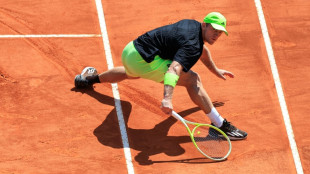
-
 Scheffler, McIlroy seek fast start as 89th Masters tees off
Scheffler, McIlroy seek fast start as 89th Masters tees off
-
EU halts counter-tariffs but no pause in US-China trade war

-
 Australian schoolboy Gout Gout runs sub-10 second 100m --- twice
Australian schoolboy Gout Gout runs sub-10 second 100m --- twice
-
Scarlett Johansson to star at Cannes as festival unveils line-up

-
 Stock markets soar as Trump delays painful tariffs
Stock markets soar as Trump delays painful tariffs
-
Trump tariffs weigh on Germany as institutes cut forecasts

-
 US and Russia exchange prisoners
US and Russia exchange prisoners
-
Japan top yakuza group promises 'no more trouble'
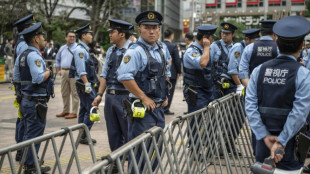
-
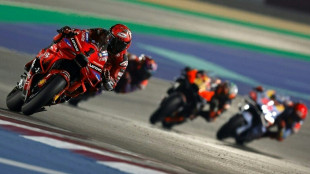 Champion Martin eyes Qatar return as 'bitter' Marc Marquez seeks redemption
Champion Martin eyes Qatar return as 'bitter' Marc Marquez seeks redemption
-
The US citizens still held in Russian prisons

-
 US-Russian ballet dancer Ksenia Karelina freed by Moscow: Rubio
US-Russian ballet dancer Ksenia Karelina freed by Moscow: Rubio
-
Not just penguins on Antarctic islands hit by Trump tariffs

-
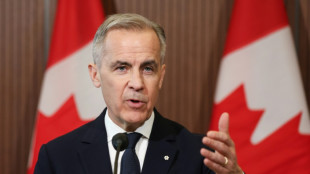 Canada PM says Trump's pause on tariffs a 'welcome reprieve'
Canada PM says Trump's pause on tariffs a 'welcome reprieve'
-
Witkoff and Araghchi: the men leading US-Iran nuclear talks
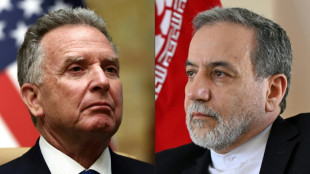
-
 Stocks zoom higher as Trump delays painful tariffs
Stocks zoom higher as Trump delays painful tariffs
-
China urges US to meet 'halfway' as markets rocket on Trump tariff pause
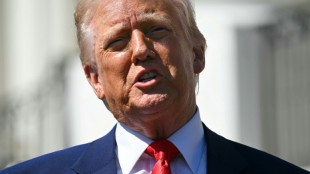
-
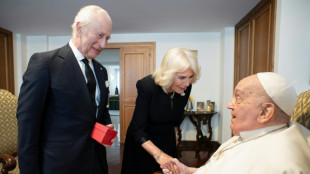 Vatican releases image of Charles, Camilla meeting pope
Vatican releases image of Charles, Camilla meeting pope
-
Waratahs' McKellar rules out becoming next Wallabies coach

-
 Taiwan's TSMC says first quarter revenue up 42 percent
Taiwan's TSMC says first quarter revenue up 42 percent
-
Rybakina leads Kazakhstan to BJK Cup victory over Australia

-
 Vietnam says it will start trade talks with United States
Vietnam says it will start trade talks with United States
-
Expo 2025 in Japan: five things to know

-
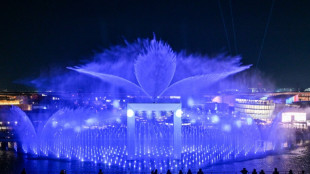 Japan's World Expo touts unity, and algae, in turbulent times
Japan's World Expo touts unity, and algae, in turbulent times
-
Trump's tariff pause gives market relief, but China trade war intensifies

-
 Papua New Guinea lifts ban on forest carbon credits
Papua New Guinea lifts ban on forest carbon credits
-
AI surge to double data centre electricity demand by 2030: IEA

-
 Scheffler, McIlroy seek fast start in hunt for history at Masters
Scheffler, McIlroy seek fast start in hunt for history at Masters
-
Samsung under pressure as US tariffs rattle South Korean economy

-
 Munster wary of 'chaotic' Bordeaux-Begles in Champions Cup quarter-final
Munster wary of 'chaotic' Bordeaux-Begles in Champions Cup quarter-final
-
Ranieri eyeing Champions League for Roma before derby swansong
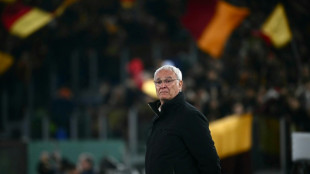
-
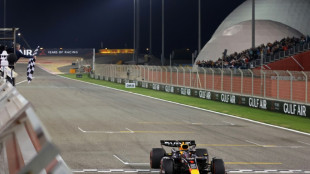 Verstappen out to silence McLaren in the battle of Bahrain
Verstappen out to silence McLaren in the battle of Bahrain
-
Asian stocks crack higher as Trump delays painful tariffs

-
 Cannes to unveil film selection under pressure over industry abuse
Cannes to unveil film selection under pressure over industry abuse
-
Messi scores twice in Miami's frantic comeback over LAFC

-
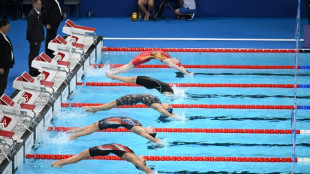 Swimmers get medal boost with new events added for 2028 Olympics
Swimmers get medal boost with new events added for 2028 Olympics
-
Companies keen to start deep-sea mining off Norway

-
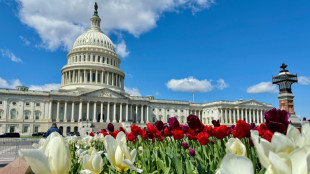 US House votes to limit judges' injunction power
US House votes to limit judges' injunction power
-
Pilgrims in Italy flock to tomb of first millennial saint
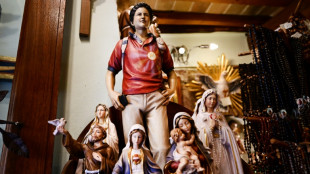
-
 China consumer prices slump for second straight month: data
China consumer prices slump for second straight month: data
-
Tearful Doncic scores 45 on return to Dallas as Lakers clinch playoff spot

-
 Hamas leadership operating behind veil of secrecy
Hamas leadership operating behind veil of secrecy
-
Trump stuns with tariff backtrack but hikes China rate to 125%
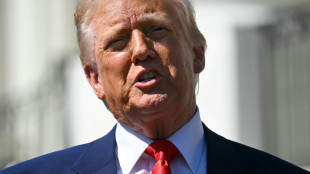
-
 Messi scores twice in Miami's three goal comeback over LAFC
Messi scores twice in Miami's three goal comeback over LAFC
-
Amazon satellite launch scrubbed due to weather

-
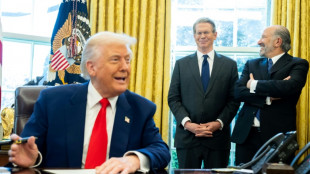 Art of the deal? How Trump backed down on tariffs
Art of the deal? How Trump backed down on tariffs
-
Icotrokinra Results Show 75% of Adolescents with Plaque Psoriasis Achieved Completely Clear Skin and Demonstrate Favorable Safety Profile with a Once Daily Pill

-
 Verde(R) Announces New Biobased, Biodegradable PolyEarthylene(R) Film Grades
Verde(R) Announces New Biobased, Biodegradable PolyEarthylene(R) Film Grades
-
Berkeley SkyDeck Demo Day to Showcase Unprecedented Momentum in AI

Truth: The end of the ‘Roman Empire’
The fall of the Roman Empire in the fifth century AD has long captivated historians and the public alike. For centuries, scholars have debated the precise causes of the Empire’s decline, offering myriad explanations—ranging from political corruption and economic instability to moral degeneration and barbarian invasions. Yet despite the passage of time and the wealth of research available, there remains no single, universally accepted answer to the question: why did the Roman Empire truly collapse?
A central factor often cited is political fragmentation. As the Empire grew too vast to govern effectively from one centre, Emperor Diocletian introduced the Tetrarchy—a system dividing the realm into eastern and western halves. While initially intended to provide administrative efficiency, this division ultimately paved the way for competing centres of power and weakened the unity that had long defined Roman rule. Frequent changes of leadership and civil wars further sapped the state’s coherence, undermining confidence in the imperial regime.
Economics played an equally crucial role. Burdened by expensive military campaigns to protect ever-extending frontiers, the Empire resorted to debasing its currency, provoking rampant inflation and eroding public trust. The resulting fiscal strains fuelled social unrest, as high taxes weighed heavily upon small farmers and urban dwellers alike. Coupled with declining trade routes and resource depletion, these pressures contributed to a persistent sense of crisis.
Compounding these challenges was the growing threat from beyond Rome’s borders. Germanic tribes such as the Visigoths, Vandals, and Ostrogoths gradually eroded the Western Empire’s defensive capabilities. While earlier Roman armies proved formidable, internal discord had dulled their edge, allowing external forces to breach once-impenetrable frontiers.
Modern historians emphasise that the Empire did not fall solely because of barbarian invasions, moral decay, or fiscal collapse; instead, its downfall was the outcome of a confluence of factors, each interacting with the other. The story of Rome’s fall thus serves as a stark reminder that even the mightiest of civilisations can succumb to the inexorable weight of political, economic, and social upheaval.

EU: Greenpeace warns of dying farms

EU: Tariffs on all Chinese electric Cars

Zelenskyy: ‘What worked in Israel work also in Ukraine’

Electric car crisis: Future of a Audi plant?

Vladimir Putin, War criminal and Dictator of Russia

EU vs. Hungary: Lawsuit over ‘national sovereignty’ law

Ukraine: Zelenskyy appeals for international aid

Lebanon: Is a new wave of refugees coming to the EU?

Terrorist state Iran attacks Israel with missiles

Belarus: ICC investigates dictator Lukashenko

NATO: Ukraine ‘at the top of the list!’



